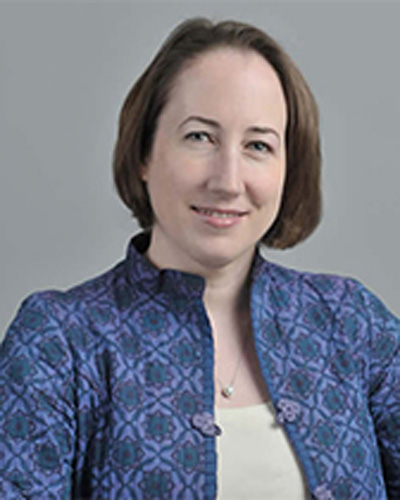Generation Action hosts first in series on reproductive health

Source: Northwestern University
Legal studies Prof. Joanna Grisinger. Grisinger lectured students Monday in the first of Planned Parenthood Generation Action’s series “The Class You Never Got to Take,” which will run through the end of May.
May 6, 2019
Students gathered Monday at Harris Hall for the first in a series of lectures addressing reproductive health.
Legal studies Prof. Joanna Grisinger spoke as the first lecturer in Planned Parenthood Generation Action’s series “The Class You Never Got to Take.” The lectures, which consist of 50-minute talks held in Harris Room 107, will run through the end of May and feature speakers from the psychology department, gender and sexuality studies department, African American Studies Department and the Women’s Center.
Emily Cerf, the communications chair for Generation Action, described the lecture series as “a space to hold lessons and conversations we need more of and never can have enough of.”
The Medill sophomore said the event is the largest organized by Generation Action since the group began operations at the beginning of the academic year. Previous events had included hosting actress Sophia Bush and Illinois Attorney General Kwame Raoul, organizing a counter-protest in response to a pro-life rally on campus, and co-hosting events with the South Asian Students Alliance and fraternity Lambda Chi Alpha, she said.
Grisinger’s lecture, titled “Gender and the Law,” was attended by about 35 mostly female students and addressed the legal status of reproductive rights in the United States, detailing how lawmaking had addressed abortion and contraception as well as involuntary sterilization since the Civil War.
Describing lawmaking as the practice of deciding “where decision-making power is allocated,” Grisinger detailed reproductive law from the anti-“vice” movements of the late nineteenth century to the landmark Supreme Court case Roe v. Wade and the rollback of many of Roe’s provisions nearly 20 years later under Planned Parenthood v. Casey.
“It’s a history that we don’t talk that much about. That’s why I thought it was really important to come and do this,” Grisinger told The Daily after the lecture.
Grisinger also addressed challenges to abortion law since the Casey ruling, noting how the introduction of the “undue burden” clause in that ruling had allowed states to implement laws designed to discourage women from seeking an abortion. In particular, Grisinger pointed to Targeted Regulation of Abortion Providers laws, which she said attempt to restrict the number of abortion providers by requiring their facilities to meet unnecessary and oftentimes expensive standards.
Grisinger also noted a revived challenge of federal abortion law by state legislators since 2016. She opened and closed her lecture on a PowerPoint slide of headlines documenting the passage of legislation in “flagrant” defiance of federal abortion laws, which was often refuted by federal judges.
“There is no question that these laws do not comply with Casey,” Grisinger said, adding that this legislation was designed to provoke a constitutional challenge that would put abortion law in front of the Supreme Court, which has gained two conservative justices under the Trump administration. She said the court may now have to respond to new laws and potentially revisit Roe v. Wade.
“We’re now decades into a Roe v. Wade world … but it’s also clear there’s a significant conservative movement that views Roe v. Wade as a mistake,” she said. “It’s entirely possible that they overturn Roe v. Wade.”
Email: joshuairvine2022@u.northwestern.edu
Twitter: @maybejoshirvine
Related Stories:
– Actress Sophia Bush of One Tree Hill comes to campus to encourage young people to vote
– Alternative Student Breaks and Generation Action adopt room in Evanston’s domestic violence shelter


